
As the winter draws to an end and spring emerges, along with the warmer temperatures comes with it the increase in pollen and mold. This time of year can be a challenging, and miserable time of year for those suffering with seasonal allergies.
The CDC estimates that 60 million people in the United States suffer from seasonal allergies. Some people are more prone to allergies than others, such as asthmatics and those suffering from other respiratory diseases.
Is it a cold or allergy?
Colds and allergies share many of the same symptoms. How to tell if you are coming down with a cold or allergies?
According to WebMD:
A cold is an infection caused by a virus. Allergies are your immune system’s reaction to a substance like pollen or pet dander. Because the two conditions cause similar symptoms, like sniffles and stuffiness, many people get them mixed up. Knowing which is which can help you get the right treatment, and that will help you feel better faster.
It’s Probably Allergies If:
Your mucus is clear or watery. And it will stay clear, instead of becoming thick or discolored like it can with a cold, says Michael Benninger, MD, an ear, nose, and throat specialist at the Cleveland Clinic.
Your eyes are itchy or watery. It’s rare to have itchy eyes when you have a cold.
Your symptoms stay the same. “Allergies may feel extra intense for the first day or 2, but you’ll have the same symptoms day after day,” Benninger says.
You’ve had the sniffles for more than a week. A cold usually clears up in 7 to 10 days, but allergies can last several weeks or longer.
Your symptoms show up only in certain situations. Find yourself sneezing every spring or fall? Those are common times for allergies. ( Colds and the flu usually show up in the late fall and winter.) Another allergy tip-off: Being in a specific place makes you feel miserable — for example, in a house with a cat.

How to deal with allergies:
1) Remove the offending substance- are there houseplants in bloom that are causing your symptoms? Strong odors from room fresheners or perfumes can cause allergic reactions. Any animals that you may be allergic to? You may need to consider avoiding them if able.
2) Vacuum floors, walls and windowsills and wipe down all surfaces with a few drops of tea tree oil and water. The tea tree oil helps kill mold and keeps it from coming back.
3) Run a portable hepa filter in your room, especially in the room you sleep in. Leave it on for at least 24 hours with the door closed to begin with. This will clear out any allergens, dust and mold that may be in the air. After the initial 24 hours has passed run the filter during the day and try shutting off at night if the sound bothers you.
4) Eat raw, local honey. This helps prime your immune system to recognize your local pollen as a normal part of the environment, not something to react to.
5) Try cutting out dairy for a week. Studies have shown that eating dairy can exacerbate inflammatory responses and make allergies worse. Dairy also causes mucus buildup and can make symptoms worse.
6) Use a neti pot to rinse out sinus passages. This will remove the pollen and help alleviate allergies. Be sure to use sterile water when using the neti pot.
7) Try taking probiotics, specifically Kyo-Dophilus, a probiotic combination of lactobacilli and bifidobacteria in the form of a capsule sold in stores. This probiotic was shown to reduce allergic symptoms in a study conducted by University of Florida food, science and human nutrition department. It may not cure your allergies, however it is widely known that healthy gut bacteria regulate and strengthen the immune system and fight inflammatory responses.
8) Drink plenty of good quality water. This helps flush out irritants invading your sinus membranes.
9) Throw your pillows in the dryer on high every week for 15 minutes to kill dust mites. Dust mites can cause allergies and love the warm dark and damp environment your pillows provide. While you are at it, wash bedding frequently, not just bedsheets.
10) Make sure your air conditioner and heater filters, vents and crawlspaces are cleaned and changed periodically. You could inadvertently be blowing in irritants from the filters when you use these appliances.

Allergy medications, prescription and over the counter
If you are on any allergy or asthma prescription medication, be sure to have plenty on hand. Make sure inhalers, epi-pens and medications aren’t expired and if they are getting close to expiration obtain a fresh supply.
Over the counter allergy medications– many used to be prescription- can have side effects. Benadryl, for example has been shown to cause driving impairment on par with alcohol ingestion. In fact, in California you can be arrested if under the influence of Benadryl or other medications that impair your driving. Allergy medicines can interact with other medications. Check with your primary care provider before taking any allergy medicines.
A good website for information on drug interactions and what to avoid is is the FDA site: Some Medicines and Driving Don’t Mix.
